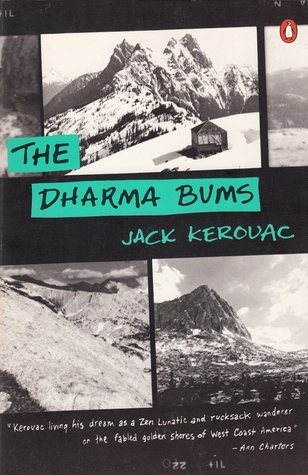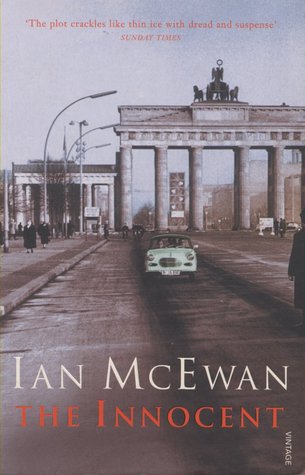 There’s one hit wonders that really only have one hit. Then there’s hits that cause collateral damage – the force of the hit lifts some of their other work into pseudo-hit status as well. After The Knack scored a hit with “My Sharona” they had one or two other singles limp along to the backwaters of the charts. Nobody was fooled. They were a one hit band.
There’s one hit wonders that really only have one hit. Then there’s hits that cause collateral damage – the force of the hit lifts some of their other work into pseudo-hit status as well. After The Knack scored a hit with “My Sharona” they had one or two other singles limp along to the backwaters of the charts. Nobody was fooled. They were a one hit band.
On the Road, a confusing novel that captured a cultural era, was Jack Kerouac’s hit. If you’ve read any of his other works, you have that novel to thank. The Dharma Bums comes across as a sappy, maudlin coda to that book – where he shows that he’s not just a crazy hellraiser, he’s also sensitive and spiritual.
Or…something. Beat Generation books are notoriously difficult to analyse, because it’s a movement that prizes nebulous emotions and epiphanies instead of actual ideas and content. Want to be “Beat”? Feel vague inklings of belief that never coalesce into a creed. Experience vague feelings of dissatisfaction that never ferment rebellion. Play “The Times They Are a-Changing” on repeat, learn to play the sitar badly, and study the Noble Eightfold Path while pounding THC into your system. Congratulations. You are now “Beating Off.”
The Beat Generation could never make a positive or negative case about anything. There’s the feeling that applying sanity and epistemology destroys the magic of the thing. This is certainly a valid way to feel, especially when you’re young, but it’s difficult to translate that feeling into a book. When you refuse to clarify or firm up anything beyond a laconic “soak in the vibes, man!”, you often end up with a book about nothing.
The Dharma Bums almost but doesn’t fall into that category. It’s a short book about nothing.
This feels like it was written for children. It’s a series of simple, unexamined actions, blaring like a note on a cheap Casio keyboard. We’re climbing a mountain! We’re riding a car! These mundane activities are described in paroxysms of joy and religious ecstasy.
And the food. There’s so many descriptions of them eating that it’s like Brian Jacques’ infamous Redwall books – again, books for children. Have you ever noticed that food fulfills the role in children’s books that sex fulfills in adult books? If the luxurious descriptions of food in the Dharma Bums were sex acts, this might be the most censored book in American history.
There’s exactly one moment – the suicide of a fragile female character, I believe – where it seems like Kerouac’s getting ready to do something. I was still waiting for this something when I turned the last page of the Dharma Bums. Ultimately, you’re left with a book that seems to satirize the delirious, masturbatory emptiness of the Beat experience – except it doesn’t seem to have been written as a satire.
On the Road wasn’t a great book it was better than this: a mild-mannered ramble through mid-50s Americana that not only pulls out the Beat Era’s fangs, but pulls out every other tooth as well. The Dharma Bums is so soft and repetitive that it’s like being gummed to death. The Dharma Gums.
No Comments »
 The second of the classic-era Helloween albums, Keeper part Deus is a fifty minute fanfare of melodic power metal that leaves no tooth unrotted. Until Helloween, power metal’s approach was “a spoonful of sugar helps the medicine go down.” Afterwards, it was “a spoonful of sugar helps the sugar go down”.
The second of the classic-era Helloween albums, Keeper part Deus is a fifty minute fanfare of melodic power metal that leaves no tooth unrotted. Until Helloween, power metal’s approach was “a spoonful of sugar helps the medicine go down.” Afterwards, it was “a spoonful of sugar helps the sugar go down”.
It’s a little less earnest in its sweetness than Keeper 1, and a little more self-parodic. You can see vague reflections of the internet conflict that would eventually break up the band. Imagine the creepy forced-happy vibe of “Future World” spread over an entire album. At times, Keeper 2 sounds like fiddlers playing as the ship sinks.
It’s not as good as the first one, mostly because Michael Weikath has stepped into the role of primary songwriter here – the album’s absolutely infested with his tracks, and other than the opener “Eagle Fly Free” he doesn’t do anything truly great here. “Dr Stein” and “Rise and Fall” are midpaced, and quickly let the excitement ebb away. The closing epic just doesn’t have enough songwriting-fu to stay interesting for 13 minutes.
Michael Kiske’s contributions are likewise forgettable: he has a spectacular voice, and not much else. It was once joked that Jayne Mansfield’s acting abilities consisted of filling out a sweater. In Kiske’s case, his one redeeming attribute is located a few inches further up on his sternum.
But suddenly, the goods get develivered. Kai Hansen’s lonely three songs run back to back to back in the album’s middle, and they’re arguably the best three song run in Helloween’s history.
“Save Us” is fast and savage, upping the ante on “Twilight of the Gods.” “March of Time” is another golden Helloween standard that delivers everything you could want from this band. “I Want Out” is genius that years of overplay only slightly diminishes, featuring a jagged dual-guitar melody and lots of great vocal acrobatics. The lyrics pretty much state Kai’s frame of mind at the time. It’s good that he only wanted out from Helloween, not out from power metal.
Pablo Picasso years trying desperately to do something new, something unique. He moved from style to style, mastering and then rejecting methods…and then he paid a visit to the newly discovered Lascaux cave paintings. As the story goes, seeing these 16,000 year old works of art almost broke him. “We have invented nothing!”
Helloween’s Keeper albums might provoke a similar reaction to fans of modern Nuclear Blast-style metal. Other than the thunderous orchestras (which Helloween couldn’t afford in the era before software symphonies), there’s really nothing around today that wasn’t either invented or perfected here. Bits and pieces of power metal have always existed, from Iommi’s overdubbed guitar tracks to “Highway Star’s” duelling solos to Meat Loaf’s shamelessness. Helloween took those elements and made a style out of it. It’s naive, inconsistent, and sometimes irritating. It’s also the bedrock of a good amount of what’s considered cool today.
Which is ironic, because this album is weapon-grade uncool.
No Comments »
 How much control do artists have over their work? Are they like, Yen Sid, conjuring miracles with a master’s hand? Or are they like Mickey Mouse, magic erupting haphazardly from their wands, praying everything goes right?
How much control do artists have over their work? Are they like, Yen Sid, conjuring miracles with a master’s hand? Or are they like Mickey Mouse, magic erupting haphazardly from their wands, praying everything goes right?
Basically, when this book goes off the rails, was it an accident or was it Ian McEwan’s plan from the start?
The beginning is compelling. It’s the 1950s, and a British electrical engineer is flown out to help a covert American spy operation in West Berlin. Russian communications all pass through the city before being routed back out to the Kremlin. It’s thought that by digging a tunnel into East Berlin and installing monitoring equipment there, US and British intelligence can obtain an electronic peephole through the Iron Curtain.
He’s young and naive. The Americans don’t trust him. McEwan weaves fictional and nonfictional elements together, and soon he has the makings of a promising spy novel. But soon, he meets a German woman, and some “horizontal collaboration” occurs. She’s already married, to a semi-vagrant all-alcoholic who beats her. Probably par for the course when a woman burns a steak in the 1950s, of course, but since Maria doesn’t cook steak I guess the beatings are on the house. One day, this husband discovers the affair, and all hell breaks loose.
I don’t know what to say about the book’s romance elements. Midway through it almost forgets about the compelling spy background and just focuses on Maria and Leonard’s assignations full time. They’re long, not super interesting next to the spying, and it’s disheartening to see the book’s remaining pages get relentlessly pared away by this stuff.
I’ve never liked an overemphasis on romance in art. People find it fascinating for some reason, maybe because they’ve had more experience at it than me, and they’re able to color the fictional descriptions with their own memories. To me, the coloring book remains closed. The experience of love is essentially an emotional common cold: you have it, then eventually you don’t. It’s a mundane thing that happens to thousands of people every day. Who cares? Digging underneath the Berlin Wall to intercept Kremlin communiques – now that’s what I want to hear about.
The book eventually shows its colours as a meditation on innocence. Even this comes off as unsatisfying, as the story’s backdrop is too huge and interesting for a low-key bildungsroman to work. The war is growing colder. Stormclouds gather. Friends sharpen knives for each other. Against all this, you’ve got a guy learning to have sex? That’s the sort of thing that gets made fun of on the @GuyInYourMFA twitter account. “My protagonist is only referred to as ‘the boy.’ On the final page? ‘The man.'”
But everything except the foreground elements are really well done. Why couldn’t McEwan have focused more on the things that were working, instead of forcing in something that fundamentally doesn’t?
I guess the romance actually was the main point of the book, and the spy context is just a backdrop. That makes The Innocent the most disappointing kind of presents: the one where the packaging is more interesting than the contents.
No Comments »
 There’s one hit wonders that really only have one hit. Then there’s hits that cause collateral damage – the force of the hit lifts some of their other work into pseudo-hit status as well. After The Knack scored a hit with “My Sharona” they had one or two other singles limp along to the backwaters of the charts. Nobody was fooled. They were a one hit band.
There’s one hit wonders that really only have one hit. Then there’s hits that cause collateral damage – the force of the hit lifts some of their other work into pseudo-hit status as well. After The Knack scored a hit with “My Sharona” they had one or two other singles limp along to the backwaters of the charts. Nobody was fooled. They were a one hit band. 

